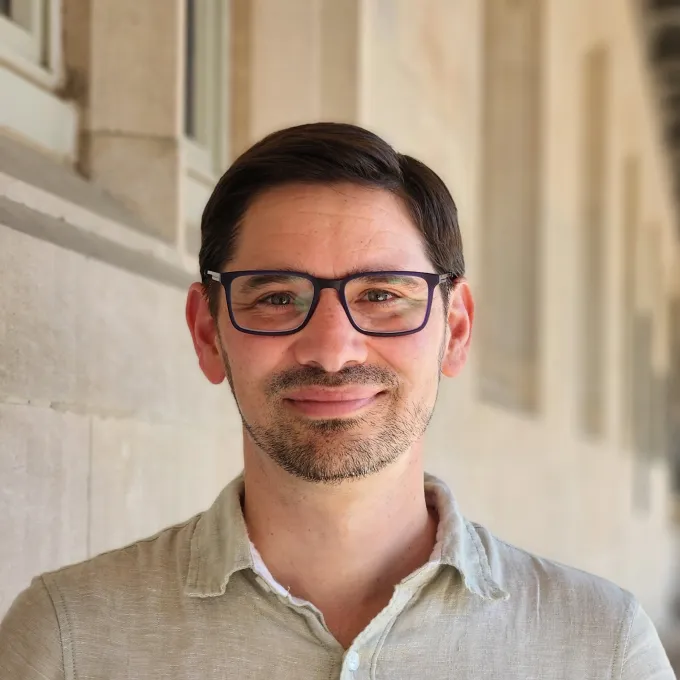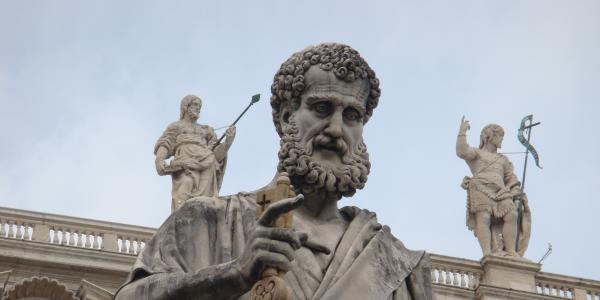https://classics.wustl.edu/xml/faculty_staff/12814/rss.xml
Lance Jenott teaches courses in Classics and religious studies, with a focus on early Christianity and classical civilizations.
Jenott's research interests include New Testament and Christian origins, second temple Judaism, and religions of antiquity. His Hermeneia Series commentary on the Gospel of Judas is under contract with Fortress Press.
recent courses
Historical Introduction to the New Testament
What can be known -- from an historical perspective -- about the life and teachings of Jesus and his earliest followers? How did Jesus see himself and how did his followers see him? How did the lives, teachings, and deaths of Jesus and his followers come to form the heart of a new movement? If Jesus and the apostles were all Jews, how did Christianity emerge as a distinct religion? This course investigates these questions through a focus on the earliest sources for Jesus and his first followers, including and extending beyond the canonical books of the Christian New Testament. Our approach in this course is historical and literary, rather than theological or confessional: we ask what Jesus, his first followers, and their Jewish and pagan contemporaries did and believed, and we try to catch glimpses of the worlds in which they lived and the cultures which they took for granted.
Magicians, Healers, and Holy Men (CLASSICS 3830)
Magic is perhaps not one of the first words one associates with Greco-Roman antiquity. Yet for most individuals living in the ancient Mediterranean, including philosophers, businessmen, and politicians, magic was a part of everyday life. Casting spells, fashioning voodoo dolls, wearing amulets, ingesting potions, and reading the stars are just some of the activities performed by individuals at every level of society. This course examines Greco-Roman, early Christian, and Judaic magical practices. Students read spell-books which teach how to read the stars, make people fall in love, bring harm to enemies, lock up success in business, and win fame and the respect of peers. Students also look at what is said, both in antiquity and in contemporary scholarship, about magic and the people who practiced it, which helps illuminate the fascinating relationship between magic, medicine, and religion.
Beginning Greek I (GREEK 1510)
An introduction to Classical Greek (Attic), which will prepare the student to read texts in Greek History, Philosophy, and Medicine as well as the New Testament. This course builds the foundations for readings in Greek Tragedy, Comedy, and Lyric poetry. Our goal will be to develop reading knowledge as rapidly and efficiently as possible. By the end of the year the student should be reading continuous Greek prose.
Beginning Coptic I (CLASSICS 1510)
This course provides an introduction to the Coptic language in the Sahidic (southern) dialect. Coptic was the vernacular language spoken and written in Egypt during the Roman, Byzantine, and Arab periods (until about 1300 CE) and as such is important for studying the history of premodern Egypt. It preserves some of the oldest known translations of the Bible, many apocryphal and heretical books that illustrate the wide diversity of ancient Christianity (e.g., the Gospels of Thomas and Mary), as well as sermons, saints' lives, monastic instructions, and liturgical manuals that still constitute the literary culture of the Coptic Orthodox Church today. In addition, a plethora of magical papyri illustrate medical and religious practices; personal letters reveal the lives of everyday people; and troves of business documents (e.g., contracts, wills, governmental petitions, receipts) have proved important for understanding Roman and Byzantine economies. Because Roman Egypt was a highly bilingual society, there are even instances of Classical Greek literature translated into Coptic (e.g., selections of Homer and Plato), and these offer a unique witness to how such texts were received by Egyptians. The goal of this course is to cover 15 of the 20 lessons in the grammar book. The remainder will be covered in the second level of this course.
Selected Publications
Books
The Monastic Origins of the Nag Hammadi Codices, co-authored with Hugo Lundhaug. Studies and Texts in Antiquity and Christianity 97. Mohr Siebeck, 2015.
The Gospel of Judas: Coptic Text, Translation, and Historical Interpretation of the ‘Betrayer’s Gospel.’ Studies and Texts in Antiquity and Christianity 64. Mohr Siebeck, 2011.
Articles and Book Chapters
“The Book of the Foreigner from Codex Tchacos.” Bulletin of the American Society of Papyrologists 57 (2020): 235-76.
“Reading Variants in James and the Apocalypse of James: A Perspective from New Philology.” Pages 55–85 in Snapshots of Evolving Traditions: Jewish and Christian Manuscript Culture, Textual Fluidity, and Material Philology, ed. Liv Ingebord Lied and Hugo Lundhaug. Texte und Untersuchungen zur Geschichte der altchristlichen Literatur. De Gruyter, 2016.
“Recovering Adam’s Lost Glory: Nag Hammadi Codex II in its Egyptian Monastic Environment.” Pages 222–43 in Jewish and Christian Cosmogony, ed. Lance Jenott and Sarit Kattan Gribetz. Mohr Siebeck, 2013.
Translations
“John of Parallos, Homily Against Heretical Books” and “The Investiture of the Archangel Gabriel.” Pages 553-79 in New Testament Apocrypha: More Noncanonical Scriptures, vol. 2, ed. Tony Burke. Eerdmans, 2020.
From our podcast:

Saint Peter, according to Mark
The apostle Peter was a leader and role model in early Christianity - or was he? According to Lance Jenott, a lecturer of classics and religious studies, how we understand Peter depends on who is telling the story.




